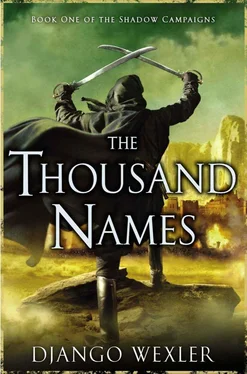Django Wexler - The Thousand Names
Здесь есть возможность читать онлайн «Django Wexler - The Thousand Names» весь текст электронной книги совершенно бесплатно (целиком полную версию без сокращений). В некоторых случаях можно слушать аудио, скачать через торрент в формате fb2 и присутствует краткое содержание. Жанр: Фэнтези, на английском языке. Описание произведения, (предисловие) а так же отзывы посетителей доступны на портале библиотеки ЛибКат.
- Название:The Thousand Names
- Автор:
- Жанр:
- Год:неизвестен
- ISBN:нет данных
- Рейтинг книги:4 / 5. Голосов: 1
-
Избранное:Добавить в избранное
- Отзывы:
-
Ваша оценка:
- 80
- 1
- 2
- 3
- 4
- 5
The Thousand Names: краткое содержание, описание и аннотация
Предлагаем к чтению аннотацию, описание, краткое содержание или предисловие (зависит от того, что написал сам автор книги «The Thousand Names»). Если вы не нашли необходимую информацию о книге — напишите в комментариях, мы постараемся отыскать её.
The Thousand Names — читать онлайн бесплатно полную книгу (весь текст) целиком
Ниже представлен текст книги, разбитый по страницам. Система сохранения места последней прочитанной страницы, позволяет с удобством читать онлайн бесплатно книгу «The Thousand Names», без необходимости каждый раз заново искать на чём Вы остановились. Поставьте закладку, и сможете в любой момент перейти на страницу, на которой закончили чтение.
Интервал:
Закладка:
Marcus sat back, feeling defeated. Janus, watching him, burst out laughing.
“Sir?” Marcus said uncertainly.
“I’m sorry,” the colonel said, still chuckling. “It’s my own fault, I think. I’m not yet used to what you might call the military context. Captain, if you disagree with me, I encourage you to say so. I’m not Karis speaking the Law.”
“You’re a colonel,” Marcus pointed out. And a count besides. “It’s not my place-”
“I intend to take advantage of your judgment and expertise. That means you must be more than a dumb recipient of my lordly wisdom. So long as the enemy are not actually before us, I expect you to correct me if I say anything foolish.”
“Yes, sir,” Marcus said. He’d forgotten how useful that phrase was-it could mean anything you wanted it to mean.
“So-you’re not really worried about the supply train, are you?”
“Sir. .” Marcus paused again, then gave an inward shrug. “There’s been talk. The men aren’t happy-well, that’s nothing new-but they don’t think we can win. They’re saying that you’re just out for glory, or that you’re mad, and if we come up against the Redeemers. .” He shook his head. “I haven’t spent much time with the recruits, sir, but the Old Colonials feel. . fragile. They’ll march, for now, but one hard rap and they’ll fly all to pieces.”
Janus said nothing. His smile had gone, replaced by a thoughtful expression, but there was still a touch of humor at the corners of his eyes. Encouraged, Marcus went on.
“Val-Captain Solwen, that is-came to me this afternoon. He said some of the new men never even made it to depot, and none of them had the full training course.”
“That’s true,” Janus said. “The Ministry was unwilling to send an experienced regiment to Khandar, so it was decided to bring the Colonials up to strength by throwing together the scraps from the depots and the backcountry recruiters.”
“Then I’m not sure hard marching is what they need. They might get where they need to be, but will they fight when you need them to?”
“Just because they’re untrained doesn’t mean they’re cowards.” Janus frowned. “I was hoping the veterans would provide some unofficial instruction.”
“From what I’ve seen, sir, the two groups don’t seem to mix much. And the recruits need to practice formations most of all. That’s not something you can do on your own time.”
The colonel tapped one finger on the table. “Nevertheless,” he said, “time is of the essence. If we delay. .” He appeared to be speaking half to himself, and didn’t wait for an answer. “I will think on it. Thank you, Captain.”
“Sir-”
“You’ve made your point.” Janus smiled again, but only briefly. “Now I need to consider.” The tent flap rustled, and the colonel looked up. “Ah, and here’s Augustin with your tea!”
• • •
Though he knew Give-Em-Hell’s men had swept the route of march, Marcus found his eyes drawn to every obstacle that might hide some kind of ambush. It made for uncomfortable riding, all the more so because Janus seemed oblivious to any sense of danger. With the sun barely past the overhead, the heat was at its worst, and Marcus had to keep wiping sweat from his eyes with the back of his sleeve. Meadow plodded placidly beneath him, unperturbed.
Behind him, the regiment trudged onward, four thousand men in blue uniforms that by now had a healthy coating of the ubiquitous brown dust. To the left, the land fell away gradually to the sea, and on the right rose a line of dry, rocky hills. In between was a strip of ground bearing what the Khandarai laughably called a road, which amounted to a pair of wagon ruts and a path worn through the scattered scrub weeds. The only virtue the track had was that it kept the men from getting lost. Hundreds had dropped out, from heat or exhaustion, and would have to straggle in as best they could after the main body finally reached camp.
And if there’s a Desoltai ambush over the next rise. . The Redeemers were the principal enemy, but it was the desert nomads Marcus feared the most. The Desoltai had never been comfortable with Vordanai hegemony, and they’d thrown in with the rebels at the first opportunity. They lived out in the Great Desol, where the more cautious Khandarai feared to go, and practiced both horsemanship and marksmanship in endless raids against one another and the surrounding towns.
And now they have a leader. The Steel Ghost, a subject of endless rumor, was supposed to have committed a dozen atrocities already, and to possess fell powers besides. But the man’s personal characteristics were less worrisome than the fact that the Desoltai were united, and committed to ridding their land of foreigners.
It wouldn’t take much. A hundred horsemen would cut us to pieces. The infantry might be able to form square, eventually, but the wagons and guns would be so much meat for the butchers. And with Give-Em-Hell out scouting, we wouldn’t be able to chase them off.
He looked at Janus, who rode with the unconcerned air of a man without a care in the world, moving with a natural grace in his saddle. Marcus scowled.
The hell of it was, the colonel was probably right. He would get away with it today-the odds of the Desoltai being so far west were small. And he’d get away with it tomorrow, and the next day, until one day he didn’t. Then it would be too late. But try explaining that to him.
He glanced over his shoulder at the drummers, three of whom walked beside the sweltering column. Each battalion had its own, stationed around the colors, and in theory signals could be relayed from one to the next, allowing orders to pass all the way down the extended line of march without the need for galloping messengers. This worked well enough on the drill field, Marcus knew, but in the field of battle only the simplest commands would get through. “March,” say, or “halt.”
Or “form square.” Marcus stiffened as the idea struck him. Just for a moment, he allowed himself to think of the possible consequences. Janus would be furious, of course, and as a count he might have influence at court in addition to his pull in the Ministry. He could. .
. . What? Ship me to Khandar? Marcus reined up, and Meadow came to a halt. After a few moments the drummers drew level.
“Sir?” one of them said, a heavyset, red-bearded man named Polt. His cheeks were slick with a sheen of sweat, and he looked about ready to drop. “Is it time to call a rest?”
Janus had proscribed rest and water breaks every two hours, but there was some time yet before the next. Marcus looked at Polt’s eager face and smiled.
“We’re having a drill. Beat emergency square,” he said.
“Sir, I- What?” He scanned the horizon frantically for signs of approaching enemies. “Really?”
“Yes, really. Do it now.”
“But-” He caught Marcus’ expression and decided not to argue. Instead he turned on his heel and addressed the two drummer “boys.” In a normal regiment, these would be promising young sub-officers, but no one promising was sent to Khandar. These two looked like they were older than Marcus.
“Emergency square!” Polt bellowed, veins standing out on his neck. “Now!”
The three carried their drums strapped to their backs, where an ordinary soldier would have his pack. They scooted them round and let them fall flat, the straps holding them at waist level, and retrieved their heavy wooden sticks. Tentatively at first, but with increasing volume, they pounded out a basic rhythm. Boom , pause, boom , pause, boom boom boom -a simple signal for a vital command that might have to be executed on a moment’s notice, with no more warning than a sentry’s scream.
Читать дальшеИнтервал:
Закладка:
Похожие книги на «The Thousand Names»
Представляем Вашему вниманию похожие книги на «The Thousand Names» списком для выбора. Мы отобрали схожую по названию и смыслу литературу в надежде предоставить читателям больше вариантов отыскать новые, интересные, ещё непрочитанные произведения.
Обсуждение, отзывы о книге «The Thousand Names» и просто собственные мнения читателей. Оставьте ваши комментарии, напишите, что Вы думаете о произведении, его смысле или главных героях. Укажите что конкретно понравилось, а что нет, и почему Вы так считаете.











